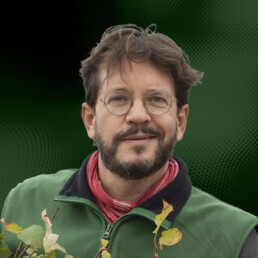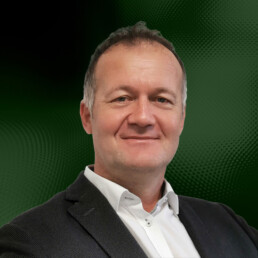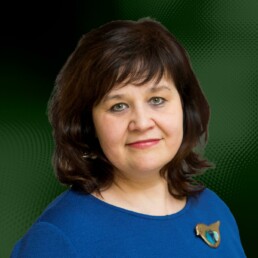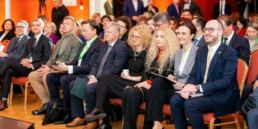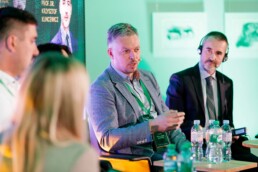AgriFood Forum 2022: today's crises, ways of solving them, possibilities, and ensuring food for all
In November, the annual largest international forum of the agriculture and food sector in the Baltic States - "AgriFood Forum 2022" - took place in Vilnius. The theme of this year's forum, which brings together leaders of academia, business and politics, was "Peace for Food". This year, the forum included almost two hundred on site guests, more than 2,300 unique online viewers, future-oriented topics, a large cross-sectoral inclusion, and a large group of foreign guests. One day of engaging presentations and discussions in Vilnius offered up to 1,000 minutes of content.
I have been following the "AgriFood Forum" actively for the past three years. Last year, if I wanted to describe the forum in one sentence, I would have said that sustainability in the agrifood sector is a strategic goal for an entire society, and its implementation is only possible by drawing a clear long-term direction and realising that cooperation between different sectors is an inevitability. This year, it can be said that different sectors have already understood and discovered opportunities for cooperation, and the intolerable military actions of Russia in Ukraine compelled the world to view food security as a matter of national security.
This time, AgriFood Forum focused on the impact of the unjustified war in Ukraine on food supply systems and ways to create healthier, fairer, more sustainable, and resilient food systems that would ensure access to affordable, quality food for everyone. Technology development, implementation, and start-up creation that could contribute to these goals were discussed. Other discussions focused on consumer expectations and new advanced farming methods in the food system. Finally, during this year's AgriFood Forum, the first meeting of European Digital Innovation Hubs (ESICs) focused on the agrifood sector took place. During it, the hubs agreed on a unique best ESIC collaboration model.
Summarizing the forum, the organizer of the event Director of AgriFood Lithuania, Kristina Šermukšnytė-Alešiūnienė, said that the most frequently heard phrases at this year's forum were war, climate change, energy, food supply chains and crisis. According to K. Šermukšnytė-Alešiūnienė, all these mentioned crises have a direct impact on the agrifood sector, and in the face of all of them, increasing the resilience of the food system is necessary. According to the expert, this requires the transformation of the sector and the introduction of innovations. In addition, it is necessary to pay more attention to the inclusion of youth and women and to understand that the desired result can only be achieved together. As the director of AgriFood Lithuania stated at the closing remarks of the forum, it is necessary to apply an innovative approach and strive to implement advanced solutions in both small and large farms.
"Supporting innovation and change, keeping up with trends, building resilience, and striving to build networks of networks must be the result of everyone working together. I really hope that when we gather in Vilnius in November next year, we will be calm about peace for food, and we will be able to talk about actions, the control and implementation of which will depend only on our own efforts", said Kristina Šermukšnytė-Alešiūnienė, the organizer of the AgriFood Forum.
Speaker of the Seimas: Agriculture is important for Lithuania's GDP
The Speaker of the Seimas, Viktorija Čmilytė-Nielsen, at the "AgriFood Forum 2022" in the Vilnius Town Hall, paid a lot of attention to the Russian factor. In order to achieve a qualitative leap for Lithuania's economy, emerging opportunities must be exploited in the agricultural and food sector.
According to the head of the Lithuanian parliament, Russia has shown very clearly and no less painfully what it means to compromise democratic principles when pragmatic considerations are placed above them, and what dangers lie when values are swept under the carpet of mercantilism. As the Speaker of the Seimas stated, for a long time some European countries have lived, one might say, impermissibly comfortably or even lazily. Understanding but ignoring the threats posed by dependence on the mercy of authoritarian regimes. Among which is the agricultural sector, and through that, fertilizers are vital for the entire food industry. Both directly and through the energy resources required for production.
"This year, Russia also turned food into a weapon. The threats surrounding us also provide unique opportunities, which, if used skilfully, can lead to a qualitative leap for Lithuania. Yes, today's reality often makes us think more often about survival than prospects. While rising costs have left farmers scratching their heads, it has fuelled even greater interest in technologies that allow farming to be both soil-conserving and cost-effective. And all this would be impossible without smart technologies. In the agrifood industry, intelligence is no longer the future. It is everyday life, without which effective operations, ensuring competitiveness and future prospects are impossible. Intelligence is unequivocally the only way for Lithuania, which can place us next to countries that are leaders in their welfare and standard of living, because they skilfully use the available resources", said the Speaker of the Seimas, Viktorija Čmilytė-Nielsen, at the "AgriFood Forum 2022".
As the head of the Lithuanian Parliament later added, looking at the dynamics of GDP in 2022, we see that good GDP growth results in Lithuania in the third quarter were ensured by good indicators of agriculture and ... IT sector. Therefore, it is now necessary (primarily for politicians) to continue to create conditions that would not stop the technological breakthrough, but encourage it. Thus, in a few more years, we could say that the growth of Lithuania's GDP is ensured not only by the separately working agriculture, food industry and IT sectors, but by their effective synergy.
Minister of Agriculture: Food is a matter of national security
Minister of Agriculture Kęstutis Navickas, who spoke at AgriFood Forum 2022, said that the theme of this year's forum "Peace with food," which previously sounded a bit serious, has become particularly relevant and important for the whole world this year.
"In the first days of the war in Ukraine, grain warehouses and food processing companies were targeted. No one could believe that the Black Sea ports could be closed. This raised grain prices across Europe and the world. It is no coincidence that we also raise this question in order to add food to the list of strategic security. In addition, the problem of food waste is not empty words, it is a specific social aspect", the Minister of Agriculture said to the audience watching the forum.
According to Minister K. Navickos, as Lithuania is dependent on energy resources and fertilizer prices, it is necessary for farmers to implement smart technologies that would preserve nature and help save farmers' financial resources. As the minister said, the current offer of innovations really allows us to do that. In addition, he suggested that biotechnology should be applied more frequently, as this would preserve crops and soil fertility, which would contribute to a safe food policy.
Marion Jansen, director of the OECD Trade and Agriculture Directorate, agreed with the Minister's thoughts. Wheat prices increased by about 60 percent in the spring due to the Black Sea grain blockade resulting from the war, according to her. This proves that the connection between food and peace is extremely relevant, because food shortages fuel unrest in countries where that food is scarce," emphasized the director of the OECD's Trade and Land Directorate.
Minister of Economy and Innovation: "FoodTech is changing the world and we are ready to help"
The Minister of Economy and Innovation, Aušrinė Armonaitė, jokingly said that the only stable thing in Europe today is that everything is constantly changing, so everyone should admit that and be ready to change constantly. According to her, food technology is an important part of biotechnology, and the Government is ready to help this sector as much as it can.
"When we reflect on the future of the agrifood sector, innovation, digitalization is an integral part of it. Food technologies, which are a part of biotechnology, have a future in Lithuania. Israel and the USA also pay great attention to this, this is a new page in Lithuania as well. Us, the Government, are ready to help you as much as we can. We have to think not only about survival, but also about new solutions, products, digitalisation, and scientific research and innovation can offer that," said the Minister of Economy and Innovation at the forum to the agrifood sector community.
Innovation is the key to success
The CEO of the largest and most influential European food innovation initiative, Dr. Andy Zynga, raised the question of what we as a society, business and science should do in this multi-layered crisis, in the agriculture and food sector. The main answer is clear - innovation, innovation and even more innovation.
"We urgently need to increase sustainability, but we must also build resilience to respond to the many serious challenges we are facing now. We need to invest in key innovations and solutions that drive the transition to climate neutrality. But we also need to understand that increasing the sustainability and resilience of the food system is not something we can do alone. All parties must cooperate and work together and understand the impact of each decision on other actors. Each of us is an important part of the food system", said the head of EIT Food, Dr. Andy Zynga.
Also, the main speaker of the forum drew attention to the fact that only 11 percent of farmers in Europe are up to 40 years old, so attracting young people to farming is a huge challenge that we will have to overcome. In addition, the head of EIT Food highlighted the issue of gender inequality in the sector.
"Women account for 60 percent of initial employment in the agrifood sector, but in managerial positions, depending on the food supply chain, this number reaches between 9 and 25 percent. This shows that the involvement of women in business creation in this sector is too low, and this will have to change. An excellent example of promoting this is EIT Food's EWA program in Lithuania, which is coordinated by AgriFood Lithuania. It is inspiring because we see how program participants continue to develop their business ideas after the program ends. The examples of the alumni of last year's program prove that" - said the head of EIT Food, Dr. Andy Zynga.
We must fight together against common enemies
During the forum, an unusual presentation was made by August Alešiūnas, an angel of the agrifood business and the owner of the innovation boutique house "ART21". A. Alešiūnas gave a speech that caused the most discussions. Responding to today's military conflicts, the businessman emphasized the importance of each actor and paid much attention to the changes that have taken place in the world in the last year.
"Today, crises or even the course of war are decided not only by the state - many other actors react to them and become part of these events. They try to defend the common values of a developed society against a common enemy regardless of their educational experience or belief. And who are the common enemies of the agrifood sector?" - this was the question raised by the business angel during the presentation.
According to A. Alešiūnas, it is pollution, broken supply chains, and food prices. During the presentation "The community we belong to. Life without protocols" the business angel said: "It's time for all small networks to unite and create a big common network, a common "army," forget the protocols, take off the jackets, roll up the sleeves and start to fight these common enemies of the agrifood sector together in reality, not in formal terms," Augustas Alešiūnas tried to inspire the gathered participants of "AgriFood Forum."
A session of discussions on Biofood and EU4BCC took place during the "AgriFood Forum"
A special session "Cooperation between the EU and the Eastern Partnership in the biofood sector: opportunities and challenges" took place during the "AgriFood Forum." The initiators of these discussions were Šiauliai Chamber of Commerce, Industry and Crafts, which implements the EUROCHAMBERS project, EU4Business: Connecting Companies.
It is important to attract new investments, create jobs, export/import, enhance the competitiveness of the Eastern Partnership organic product sector, as well as increase the competitiveness of the sector. This session discussed the potential for increased cooperation between the EU and EAC, the impact of the Russian war on EU4BCC BioFood Consortium initiatives, and what results have been achieved.
Carmen Fernandez noted that 95 percent of companies operating in the biofood sector in Eastern Partnership countries are classified as SMEs. These companies are the main economic driving force of these countries; therefore, it is necessary to ensure equal conditions of competitiveness in such countries.
According to EC official K. Dyja, in the future, it is necessary to carry out a multifunctional policy of change. This would cover several sectors and not focus on the development of only one of them. According to her, the new plan for the Common Agricultural Policy consists of three main words - fairer, greener, and socially sustainable.
Forum organizers
You can find more information about the discussions on the AgriFood Lithuania website, Facebook, LinkedIn, and YouTube accounts.
This year's forum was organized by AgriFood Lithuania together with Business at OECD, Confederation of Lithuanian Industrialists, EUROCHAMBERS, EIT Food, Smart Agri Hubs. The partners of the event were - "Vadasiga", "Akvilė", "Žemės ūkio rūmai", "Paulig Pro", "Bijola", "Lašai", "Vilnius Go".
AgriFood Forum 2022: E-DIHs - Expectations and opportunities for collaboration
To counter the global, multifaceted agrifood crisis, Agrifood Lithuania and BIAC organized the largest Baltic AgriFood Forum on the theme "Peace for Food". The event supported the Business at OECD initiative Peace for Food. The Forum attracted 180 live participants and 2300 online viewers this year. In addition to addressing agriculture's importance in urban areas, smart farming, the future consumer's vision, and the necessity of transforming agriculture into a digital enterprise, the event was a huge success.
Mantas Vilys introduced the theme "E-DIHs - Expectations and opportunities for collaboration" with a great honour. In his role as a fire starter, he highlighted the importance of the E-DIH collaboration, particularly the consortium of AgriFood Lithuania DIH, Vytautas Magnus University, Lithuanian Confederation of Industrialists, Lithuanian Innovation Center, ART21, Science and Technology Park of the Institute of Physics, Lithuanian Energy Institute and Smart Energy DIH. In the next three years, they aim to deliver more than 5000 service packages to Lithuanian companies and clients. By providing technical expertise and enabling companies to test before investing, E-DIHs help organizations improve business/production processes, products, or services. They also provide training and skills development that are necessary for successful digital transformations, such as financing advice, training, and skills development.
FoodScale Hub's Vice President of Business Development, Grigoris Chatzikostas, compared European Digital Innovation Hubs to coral reefs. In digital innovation ecosystems, there are big and small fish, hunters and prey, yet everyone performs better when they are connected than when they are isolated. E-DIHs were created to develop technologies, but also to help people who are building this ecosystem.
As a follow-up to Mantas and Grigoris' introduction, representatives of the E-DIH consortium in Lithuania were invited to participate in a panel discussion to share their insights about the current situation in the sphere. Grigoris, as a moderator was happy to invite Łukasz Łowiński - Coordinator of E-DIH Poland, Poznań Institute of Technology, Daniel Copot - Director of AgriFood DIH in Slovenia, Augustas Alešiūnas - AgTech Business Angel & Owner of ART21, Orsolya Szaplonczay - Managing Director at Innoskart DIH and Simon Maas - Chairman of the Smart Sensors 4 Agri-food S3-partnership (European Cluster Partnership of the Year 2022).
In the beginning, the discussion focused on the importance of connection within the ecosystem. Guests on the panel were asked if they had any white spots to address and if they were able to connect the dots. Considering the last three difficult years, the answer leaves much to be desired.
"During the time, we could have achieved greater results, but the unexpected pandemic prevented us from developing and strengthening ties. We could have reached greater cooperation if we had not been overtaken by the pandemic,"- started Łukasz Łowiński.
Moreover, Simon Maas emphasized the importance of seeing each other in person. As new players enter the system constantly, they need interaction. In his remarks, the creation of a consortium would allow new companies to be invited and helped. Digital transformation can be viewed from a broader perspective.
Representatives of the E-DIHs were asked about their companies' common strategy priorities, and it turned out that access to financing and investments was the top priority. It was determined that access to infrastructure and collaboration were the most important too. A sequence of priorities in this manner seems quite logical. The achievement of companies' goals will be difficult without financial support and good infrastructure. As a result, collaboration can only be fruitful after the company has completed its work and can then offer assistance and cooperation to others.
“The main difference between European Hubs and companies from the outer world is that we are slow at the beginning, but in the end, companies that belong to E-DIHs achieve better results” said Augustas Alešiūnas.
Throughout the conversation, participants emphasized the importance of diversity. Interestingly, learning from your business partners who are engaged in the same business is impossible. It is possible and even necessary to learn from businesses that have other activities in order to progress further. It can help you come up with new innovations and ideas for your business.
One of the most positive aspects is that in recent years the amount of investment in agriculture has increased. With global challenges in this field, the focus of financing has turned to challenges and digital agricultural opportunities. Almost doubled amount of investment was advanced by the agriculture sector between 2010 and 2018.
DIHs are already in the hands of the future. In order for the consortium to be successful, it must work well together so they can work efficiently and effectively. Since an innovation hub serves as a place where people collaboratively convene, conduct research, extend their influence, and serve as accelerators and incubators that serve to fuel connections and growth for cutting-edge researchers and vast entrepreneurs.
AgriFood Forum 2022: The Future Consumer - Co-Creator
Co-creation aims to listen and share for mutual benefit. Is there anything to gain from this? Insights for developing brand-new products, but also valuable consumer information. Investing in co-creation can create value completely different from conventional market research.
Professor Krzysztof Klincewicz, from University of Warsaw, presented the future consumer as a co-creator who can contribute to product development and market establishment during the Agrifood Forum 2022 panel “The Future Consumer: Food Trends, Buying Behaviours & Generational Eating Habits”. According to him, consumers should be involved in the product design process.
During the EIT food project coordinated by the university of Warsaw, they developed methodologies to bring together consumers and producers to design more innovative products. They also paved the way for slightly different ways of working with the market. In 2019, Lithuania was one of the first countries where EIT food began developing the methodology. Currently, there are 16 countries, 82 consumer groups, 43 companies, and 22 products available. There were at least 22 successful co-creation processes where consumers designed products that were later introduced to the market by companies.
“It is different from focus groups, acceptance tests or hackathons. Here, we try to work with average consumers. We try to focus on a process to really engage people to ensure that they stay motivated. And teamwork proved to be one of the essential components of this process, something that was keeping people and making them come back for more and more sessions. Finally, it is empowering people to make sure that their voices are really heard and they become the drivers and not the clients,” – said Prof. dr. Krzysztof Klincewicz.
In different panels and different consumer groups, he pointed out four dominant tendencies. First, the company listened to consumers to find out what they liked about the products, and what they disliked, so it became an "Avoid + Enhance" trend, where they could eliminate ingredients while supplementing them with others. Additionally, there is a "conveniently empowered" trend, where consumers want products that are convenient and easy to find. In spite of this, they want to feel that they have accomplished something. We will use the apple juice product as an example, which is easy to obtain, but fascinating to open because of the packaging.
There is also a growing trend of local products becoming more popular by the day, and the most interesting is the "future was yesterday" idea. People start picking up ancient recipes and rediscovering legumes and vegetables that have been forgotten for years and you might be surprised by the sources of inspiration that come from the past nostalgia, childhood memories, brands, or products that people remember because they were consuming them 20 years ago.
“Cooperation with consumers in a food production is a must,” said Mindaugas Snarskis, CEO at Vikonda Group. “When we try to please consumers, we have to have a broader purpose. We have to take into account everything, understand what we do in trying to cut waste, on what we are trying to limit our impact on the environment and etc.” he continued.
Nutrition Officer at the Ministry of Health of Lithuania, Ieva Gudanavičienė has presented the recent data from Lithuania on how consumers choose their food. Almost 82% of people choose products based on flavor, and the second important factor is products that are favorable for their health and prevention of diseases. The next important factor is the price, and the last factor is the impact of family preferences. “As a representative of the Ministry of Health I would like to see healthier alternatives that people could choose,” - informed Ieva Gudanavičienė.
Matija Bumbak, co-founder of Oyster 22, talked about their company of shellfish farmers, who grow oysters mussels and produce healthy and environmentally friendly proteins from the sea, because shellfish is having, if not negative but at least zero impacts on the environment. He agreed with prof. dr. Krzysztof Klincewicz’s idea that “future was yesterday” based on the fact that their products are healthy proteins from the sea. They have a positive effect on the environment, beneficial ingredients like omega - 3, and most of the things that consumers want in these new healthy easy to consume products. “It has all the upper trends, because of this change in consumer behavior.” - said Matija Bumbak.
Milda Kraużlis, RIS Programme Manager at EIT FOOD CLC North-East, critically judged that the topic of food waste is still being discussed. She suggested that all food waste products could be used in other industries.
“Food waste, we shouldn't be discussing it. It should be already solved. The fact that ⅓ of production, for example, vegetables, fruits, bread, etc. is wasted, is really scary. It’s a sin. We work with many start-ups that have solutions and use the waste from the food production as raw materials in different other sectors. Part of the fruit waste could be used by industry, in cosmetics. In our network, we have a start-up called Re-bread. They use food waste to produce not only cosmetics, but also vodka. We look for such talented people with innovative ideas for the new sustainable business and support them to act against food waste. I hope that at some point like in 5 or 10 years, the food waste problem will be solved and we will not discuss this topic anymore,” said Milda Kraużlis, RIS Programme Manager at EIT FOOD CLC North-East at the AgriFood Forum 22.


